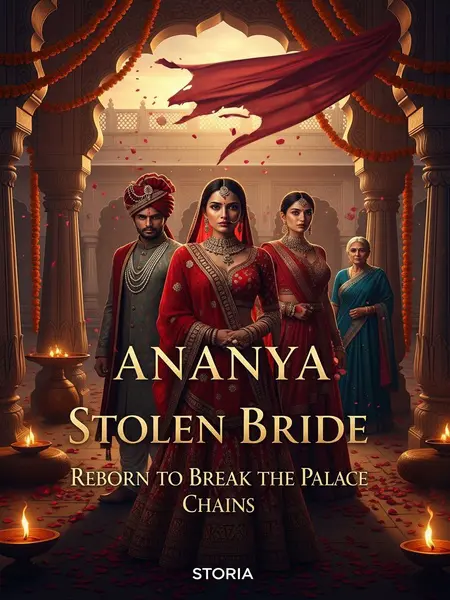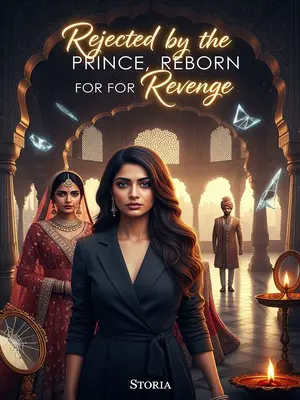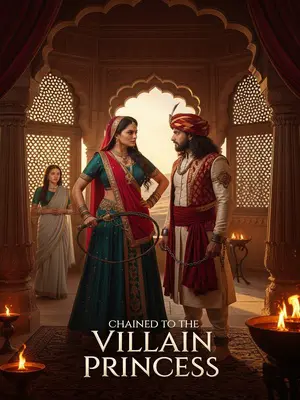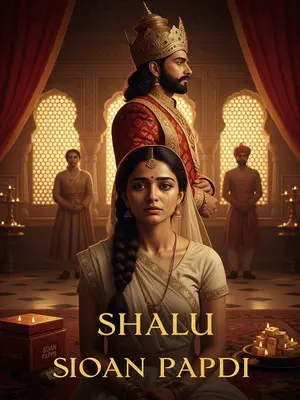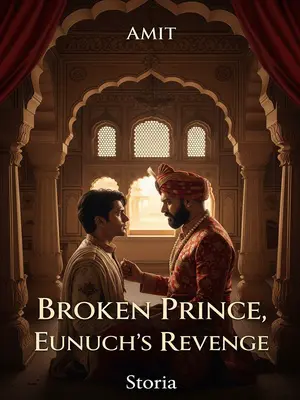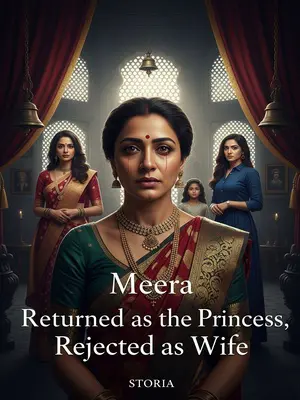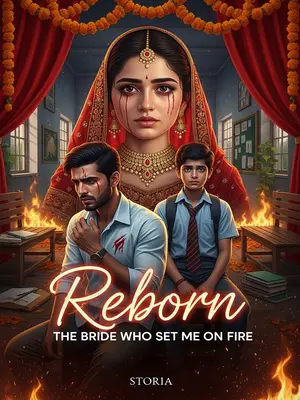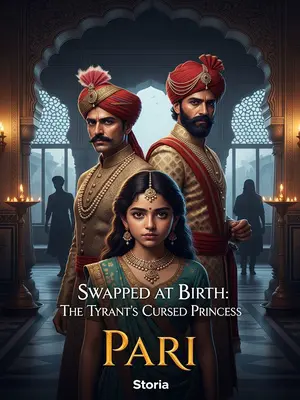Chapter 3: The Second Wife’s Peach Chunari
When I returned to the haveli, Dadi was already waiting for me.
The house was quiet except for the distant whistle of the pressure cooker in the kitchen. Dadi’s favourite jasmine flowers had been arranged in the brass vase near her bed. The old clock chimed, counting the seconds of my hesitation.
She lay half-reclined, a maid gently massaging her shoulders.
The maid’s glass bangles clinked softly as she worked, trying not to meet my eyes. A tray of paan rested on the side table, untouched. Dadi’s feet, wrapped in soft woollen socks, peeked from under her sari.
She looked as usual, but I knew she was in a foul mood.
A furrow ran deep between her brows. Her lips were pressed so thin, I wondered if they would ever part for a kind word again. Even the family cat had made itself scarce.
Sure enough, when she heard my footsteps, she opened her eyes and looked me over:
“Are you hurt anywhere?”
The edge in her voice softened ever so slightly. My heart squeezed, and I felt like a little girl again, desperate for her approval.
My heart softened, and I shook my head.
I managed a small smile, trying to reassure her even as my chest ached. The last traces of kajal under my eyes must have made me look even more tired.
She sat up, her face tense as she regarded me:
“Today, the Yuvraj sent word. He wishes to take Priya as a second wife, and the Rajmata has already agreed.”
The words dropped into the room like a stone into a well. The air shifted; even the maid stopped massaging, frozen mid-motion. Priya—my half-sister—was now to share the fate I once dreaded.
Priya—my half-sister.
I saw her face in my mind: delicate, determined, always hiding ambition behind a sweet smile. A pang of guilt—and something darker—stabbed at me.
I was stunned. This had never happened in my previous life.
I tried to read Dadi’s expression for clues, but her face was a blank wall. My mind whirred, replaying old memories and possibilities, wondering where destiny had shifted its course.
Where had things gone wrong?
Was it something I had done, or not done? I searched my heart, but found only confusion. Even the fan above us seemed to groan with uncertainty.
Dadi was still smiling, but the smile never reached her eyes:
“I wanted her to be the main wife, but she insisted on becoming a second wife.”
Her voice had a sharpness now, as if blaming Priya for disrupting her careful plans. The politics of the zenana were always twisted, never simple.
“If I hadn’t promised His Majesty to keep your marriage a secret for now, I’d truly like to see her reaction when she finds out…”
Dadi’s lips curled in amusement, but her eyes remained watchful. The rivalry she encouraged had its own rules, and I was both pawn and queen.
I fell silent.
The room felt smaller, the air thicker. Dadi’s words hung above us, heavy as monsoon clouds.
In my previous life, Dadi married me to the Yuvraj, and Priya became Prince Aryan’s main wife. In this life, with Dadi’s means, if I married Prince Aryan, she would surely try to make Priya the Yuvrani.
I imagined the old palace corridors, Dadi’s whispered instructions to the steward, the endless manoeuvring behind closed doors. The future seemed just as tangled now.
Yet Priya chose to be a second wife.
The decision was odd, almost reckless. I sensed another game was afoot, but I couldn’t yet see its end.
Recalling Dadi’s earlier words, my heart stirred:
“Dadi, do you know why His Majesty wishes to keep the marriage secret? And for how long?”
I asked softly, voice barely above a whisper. The anticipation prickled my skin, the way mango blossoms herald the coming storm.
Dadi thought for a moment before replying:
“Since the Maharani passed away, His Majesty has not treated the Yuvraj as before—perhaps he harbours suspicions.”
She paused, weighing her words carefully. I could almost see the calculations behind her eyes, the centuries of royal survival etched in every line of her face.
She looked at me as she finished:
“It cannot be hidden for long. Next month, when Prince Aryan returns to the capital, the marriage will be announced.”
The maid let out a soft breath. I nodded, relief and nervousness warring inside me. The days ahead would be a test.
I silently calculated the days—thankfully, only about ten or so remained.
Ten days. I counted them against the calendar in my mind, marking off each day like a prisoner counting down to freedom.
Priya’s wedding was set for three days later.
I watched as preparations began—strings of marigold, invitations sent out hurriedly. The air in the house was thick with the scent of henna and the clatter of preparations.
The Yuvraj wanted to take her in before the grand wedding, both to please his beloved and to give me a warning.
He was staking his claim, not just on Priya, but on the delicate power balances of the palace. It was as much a message to me as it was a gesture of affection to her.
Because the marriage was rushed and she was only a second wife, the celebration was modest.
No dholak, no grand processions. Just a few family members, a quiet ceremony under the mango tree, the priest chanting quietly, the neighbours peeking over the boundary wall.
But the Yuvraj personally came to escort her, even bringing a pair of wild peacocks he had caught himself, giving Priya plenty of face.
The peacocks, tails gleaming, were the talk of the town. My cousins giggled, “Dekho, peacock-wali shaadi ho gayi!” Priya’s smile was radiant; for a moment, she was the centre of everyone’s envy.
The usually plain Gulmohar Courtyard was now adorned with lanterns and colourful banners, brimming with festivity.
Genda phool garlands draped over the entrance, children weaving in and out, laughter ringing off the old pillars. The old gardener, Chotu, had outdone himself.
But if one looked closely, not a single bolt of silk, brocade, or dowry chest was bright red.
The absence was subtle, but keenly felt. A few sharp-eyed aunties whispered, “Arre, why not red? Kuch toh baat hai.”
Even the bride’s wedding chunari was peach pink.
The colour was pretty, but everyone knew its meaning. My heart clenched at the sight.
As Priya received the peach pink chunari, an elder auntie pressed her palm to Priya’s head in a quiet blessing, even as others whispered in the shadows, tradition and tension twined together.
I saw the joy on the Yuvraj’s face fracture bit by bit, though he quickly forced himself to smile again.
His jaw was tight, and his eyes flickered to me every few seconds, as if daring me to speak. The tension was like a barely-sheathed blade.
Lowering my gaze, I saw their hands clasped—one seemingly joyful, the other shy and timid.
Priya’s bangles jingled nervously. The henna on her palm was still dark, but her smile wavered under the weight of the stares.
Noticing my gaze, he lifted his chin provocatively and tightened his grip on the woman’s hand.
He was always proud—never one to hide a challenge. His eyes, dark and unreadable, fixed on mine, as if to say: "See what you have lost?"
I calmly looked away, ignoring his childish show.
Instead, I watched the pigeons fluttering on the courtyard railing, free in their flight.
It wasn’t until I left Gulmohar Courtyard and Dadi’s sight that the Yuvraj dragged me into a corner, his tone vicious:
The corridor smelled of incense and rosewater. I felt his hand grip my wrist too tight, the anger in his touch as sharp as his words.
“Ananya, are you jealous now?”
His tone was laced with mockery, but beneath it, a desperate edge. I met his gaze, refusing to blink first.
“You won’t even let Priya use a red wedding chunari, afraid people will know she’s just a second wife?”
The accusation stung. I folded my hands, holding my ground, feeling the marble’s chill seep through my slippers.
“By doing this, aren’t you stabbing her in the heart, making it impossible for her to hold her head up?”
The logic was twisted, but the pain in his voice was real. My heart softened for a moment, but I quickly steeled myself.
I frowned deeply and shook off his arm:
“Your Highness, isn’t it proper for a second wife to use peach pink?”
I spoke calmly, reminding myself of the rules Dadi had drilled into us from childhood. Tradition was as much armour as it was cage.
“How is that proper? Priya, she—”
His words faltered. He looked away, the muscles in his jaw working furiously.
“She what?” I looked at him, half-smiling.
He faltered, the anger draining from his face for a moment. The silence stretched between us, thick with unsaid truths.
His face flushed red, but he could not speak.
The tips of his ears went pink, betraying his embarrassment. He avoided my gaze, scuffing his shoe on the floor.
I knew what he wanted to say: Priya was the one he cherished most. How could she be like the others?
I saw it all—his love, his helplessness, his pride. But this was not my burden to carry anymore.
I spoke unhurriedly:
“If Your Highness feels she is wronged, why not ask His Majesty to make her the Yuvrani?”
The suggestion hung in the air, daring him to act on his feelings rather than hide behind tradition.
A second wife’s chunari should be peach pink—what is he being so melodramatic about?
If he is so afraid the one he loves will be slighted, why not ask for a royal decree and marry her as his wife sooner?
The rules were simple, but the heart never is. Still, if he truly cared, let him fight for her.
In the end, he simply doesn’t dare.
Sure enough, he grew angry out of embarrassment, glaring at me and laughing coldly:
“So this is the conduct of the legitimate daughter of the Raja’s household.”
He spat the words out, as if my dignity was an insult.
“Since you won’t give Priya face, then on our wedding day, don’t blame me for not giving you any.”
The threat was empty, but his pride demanded a parting shot.
I said nothing. At that moment, Priya came looking for him. I stepped aside and gestured for him to leave:
I raised my hand, my bangles jingling. “Jaaiye, Your Highness.” My voice was even, but inside, I was already miles away.
“Your Highness, please.”
He snorted coldly and left, flicking his angavastram.
The gesture was pure theatre—a silent storm. The corridor echoed with the swish of silk and the clatter of his polished shoes.
But Priya did not follow immediately.
She lingered, her eyes darting between us, her lips twisted in a smile too sharp to be sweet.
She paused, looked at me, her smile tinged with smugness:
“Didi, did His Highness scold you because of me again? I’m so sorry—”
Her voice dripped with false concern. I recognised the tone from countless childhood quarrels, always hiding knives behind words.
She leaned close to my ear, her voice barely above a whisper:
“Didi, dekhna, iss janam mein kismet kiske saath hai.”
Her breath was scented with rosewater, but her words were poison. I felt a chill run down my spine, but I refused to show fear.
As the wedding ended, the faint scent of naphthalene from stored saris hung in the air—a reminder that, beneath all the celebration, something old and cold still lingered.
